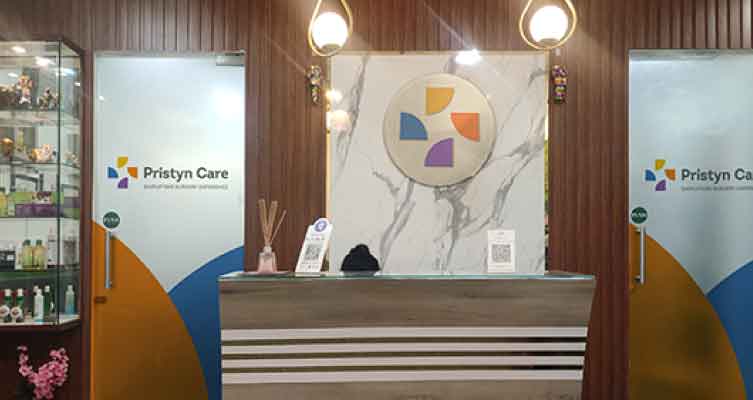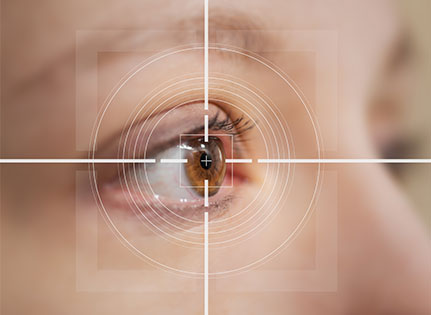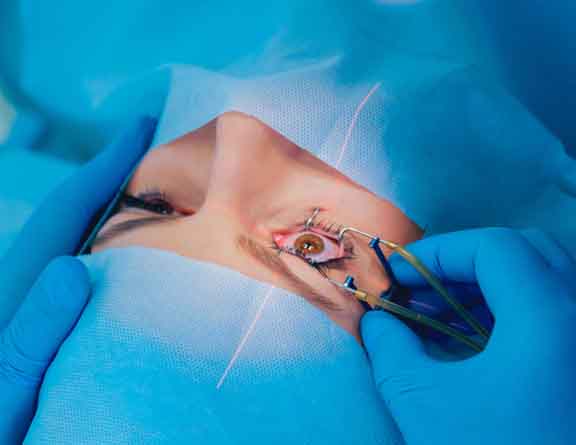
Nashik
USFDA-Approved Procedures
Support in Insurance Claim
No-Cost EMI
Same-day discharge
| Surgery Details | LASIK | PRK | Femto LASIK | SMILE | Contoura Vision |
|---|---|---|---|---|---|
| Visual Recovery | Quick recovery (within a few hours) | Slow recovery (takes up to a week) | Quicker recovery (within a few hours) | Quick recovery (within a few hours) | Quicker recovery (within a few hours) |
| Surgery Duration | 10-15 minutes | 10-15 minutes | 10-15 minutes | 10-15 minutes | 10-15 minutes |
| Technology Used | Excimer and Femtosecond laser | Excimer laser | Femtosecond laser | Femtosecond laser | Femtosecondand excimer laser, and topolyser |
| Dry Eyes | Mild to Moderate | Mild | Moderate | Mild | Mild to Moderate |
| Recovery Time | 1-2 weeks | 2-3 weeks | 1-2 weeks | 1-2 weeks | 1-2 weeks |
| Cost | Rs. 25,000 to Rs. 1,20,000 | Rs. 40,000 to Rs. 70,000 | Rs. 80,000 to Rs. 1,00,000 | Rs. 1,25,000 to Rs. 1,40,000 | Rs. 95,000 to Rs. 1,05,000 |


LASIK or Laser in-Situ Keratomileusis is a common surgical treatment to correct vision-related problems such as nearsightedness, farsightedness, and astigmatism. The concept of the LASIK technique was coined by an Indian chemist, Rangaswamy Srinivasan. He even holds the patent for ultraviolet excimer laser with James Wynne.
There are more than 400 centers for LASIK surgery in India. In the period 2007-2011, the search queries related to LASIK were the highest in India which declined by 24% in the next few years. Around 10 million Americans have had LASIK surgery since it was first approved by the FDA in 1999, states sources on the internet. LASIK is the 3rd most common procedure after tooth extraction and cataract surgery. LASIK can help to achieve 20/20 vision without any side effects in most cases. According to the study published by the Journal of Cataract & Refractive Surgery, LASIK has a 96% patient satisfaction rate.
In LASIK surgery, the eye doctor reshapes the front surface (cornea) of the eye to enable light entering the eye to focus on the retina without glasses or contact lenses. LASIK typically is pain-free and the eye specialist requires only about 15 minutes to treat both eyes. In some people, the vision improvement can be noticed immediately, while in others it can take approximately 24 hours for the vision improvement to become noticeable.
If you are suffering from vision impairment or blurry vision, you can contact Pristyn Care in Nashik and consult with some of the best eye surgeons for your treatment.


Treatment
Before confirming the LASIK eye surgery, the eye surgeon or the ophthalmologist will do a detailed eye test to check both eyes. The eye specialist will also conduct a standard eye chart test to assess your vision. The doctor may also do a tonometry test by using a minimal pain puff of air to flatten your cornea and to test the eye pressure. Additionally, the doctor may also put eye drops to enlarge the pupils so that it is easier to check the optic nerve and retina at the back of the eye and look for damaged areas. Apart from these, the eye doctor may also check for glare sensitivity or your perception of colors. Through these tests, the doctor will determine the most appropriate treatment LASIK method to restore your vision.
Before confirming the LASIK eye surgery, the eye surgeon or the ophthalmologist will do a detailed eye test to check both eyes. The eye specialist will also conduct a standard eye chart test to assess your vision. The doctor may also do a tonometry test by using a minimal pain puff of air to flatten your cornea and to test the eye pressure. Additionally, the doctor may also put eye drops to enlarge the pupils so that it is easier to check the optic nerve and retina at the back of the eye and look for damaged areas. Apart from these, the eye doctor may also check for glare sensitivity or your perception of colors. Through these tests, the doctor will determine the most appropriate treatment LASIK method to restore your vision.
At Pristyn Care, our eye specialists leverage advanced laser technology for the treatment of blurred vision. During the LASIK procedure, the doctor numbs the eyes using eye drops and an instrument called a lid speculum is placed in the eyes to keep them open throughout the surgery. An ink marker and suction ring are used to restrict the cornea movements as well. The flap is removed safely through a tiny incision to expose the cornea. The laser beam is used to remove corneal tissues bit by bit until it is perfectly shaped. Once the cornea is reshaped, the flap is placed back over the cornea without any stitches and left to heal naturally. The entire surgery takes only 20 to 30 minutes for both eyes and is done on an outpatient basis. The patient can go back home on the same day and need a few post-surgery follow-ups to ensure that their eyes are recovering properly.
Consult the Best Ophthalmologists Near You
At Pristyn Care, we leverage advanced and conventional techniques of laser vision correction to help people regain clear vision. These techniques include SBK, PRK, Femto LASIK, SMILE LASIK, and Contoura Vision.
Our LASIK surgeons specialize in all techniques of laser eye surgery. They have 10+ years of experience performing all types of LASIK surgery with a success rate of 98% or higher.
Pristyn Care provides a recovery guide and multiple post-surgery consultations without additional charges. Our care coordinators will stay in touch to ensure that you have a smooth recovery.
We provide free services that reduce the expense of the treatment at the patient’s end and offer No-Cost EMI service to divide the cost into smaller and easily payable monthly installments.
LASIK eye surgery combines the precision of a laser with the cornel flap technique. Eye surgery delivers greater precision than any other form of eye surgery. LASIK surgery corrects your vision without any complications in a comparatively shorter time. Even after the surgery, the patient faces no complications and requires minimal post-operative care.
LASIK is considered to be a safe and easy surgical treatment for the eyes. It poses very minimal complications and risks to the eyes as well as the overall health of the person. Although safe in maximum circumstances, LASIK is a delicate procedure. To ensure safety, you need to make sure that you undergo the treatment only at the hands of an experienced eye specialist.
The results and outcomes of LASIK are permanent in most cases. But it is important to understand that an individual’s vision can still change after the surgery. That is why most eye surgeons and ophthalmologists advise their patients to undergo LASIK surgery after 18 years of age when major eye changes occur. The results of LASIK surgery are more likely to be permanent after the person achieves a stabilized vision.
To diagnose and vision problems and to undergo LASIK eye surgery in Nashik, you can contact Pirstyn Care. You can find some of the best LASIK surgeons at Pristyn Care. Our doctors have years of performing LASIK eye surgeries with high success rates & hold extensive knowledge and experience in performing LASIK surgeries with extreme precision while delivering a very high success rate.
Pristyn Care is considered one of the best healthcare centers for LASIK eye surgery in Nashik. Pristyn Care is a new-age healthcare provider that houses some of the best eye specialists that are regarded as necessary for LASIK eye surgeries. The clinics and hospitals associated with us are equipped with modern facilities required for advanced eye surgeries.
The common side effects of LASIK eye surgery are:
While the conventional LASIK surgery maps about 200 points in the cornea, the Contoura LASIK maps around 22,000 points on the cornea for more accuracy. Contoura LASIK also has fewer complications as compared to the conventional technique and the damage to the tissues is relatively less.
To choose the best LASIK eye clinic, you will have to keep the following points in mind:
Consider all these aspects while making a decision and you will be able to choose the best eye care clinic to undergo LASIK surgery in Nashik.
The cost of LASIK surgery in Nashik ranges from Rs. 35,000 to Rs. 1,10,000 approximately. The exact cost depends on multiple factors, such as the severity of the refractive error, doctor’s fee, hospital charges, type of LASIK, etc. Therefore, the final cost will vary for each patient.
LASIK surgery is covered under insurance only under certain conditions, i.e., if your eyes refractive power is higher than or equal to 7.5 diopters. If the refractive error is lower than this limit, the insurance providers won’t approve the claim and you’ll have to bear the expense of vision correction from your own pocket.
Though LASIK surgery can be performed at any age group, doctors often recommend that the ideal age range for LASIK is between 25 to 40 years. This is because the eyeglasses and contact lens prescriptions usually stabilize by the age of 25. And a stable prescription is the eligibility criteria for a LASIK candidate.
Yes. LASIK completely eliminates the dependence on eyeglasses or contact lenses through a simple and minimally invasive procedure.
Almost all major health insurance companies provide ample coverage for vision correction, specifically LASIK eye surgery. The companies are:
Yes. The corneal thickness test is a very important test to determine the suitability of the person to undergo LASIK surgery. It is because the surgeon has to remove the corneal tissues to reshape the cornea and correct the refractive errors. If there are not sufficient corneal tissues, you won’t be eligible for LASIK operation.
The best way to prepare for LASIK surgery is to follow the suggestions of your eye specialist. At Pristyn Care, our ophthalmologist will thoroughly guide you through the procedure to ensure the best outcome.
LASIK treatment has become a popular way to restore clear vision in patients over the years. This is because it has many aspects that are beneficial for the patients. The key benefits of the LASIK eye treatment are:
Due to all these advantages, people are becoming more inclined to LASIK and other latest forms of vision correction too.
As there are different types of LASIK eye surgery available, patients often have a hard time determining which laser procedure is the best for the eyes. LASIK itself is a type of refractive surgery that is performed with the help of a laser. People have heard many names for LASIK, such as Femto LASIK, Contoura LASIK, Smile, etc.
However, you should understand that the primary difference between these types of surgeries is the type of laser used. It is either an excimer laser or a femtosecond laser that is used to carry out the procedure or the technique is slightly different.
But there are many other types of refractive surgeries that can help a person to correct vision problems. These different types of vision correction procedures are:
Other than these techniques, there are other laser-based procedures that can correct refractive errors and treat other eye disorders like cataracts, glaucoma, diabetic retinopathy, etc.
You should understand that undergoing LASIK surgery is not enough to get the desired results and correct all the vision problems effectively. The most crucial thing is the recovery period. In the first few days, your eyes will itch, feel gritty, burn, or become watery. Your vision may also take 24-48 hours to stabilize. And the corneal flap will take even longer to heal completely.
The complete recovery time after LASIK is around one month during which you’ll have to take many precautions and follow the doctor’s advice strictly. If you don’t follow the doctor’s instructions, there is a possibility that your final outcome of LASIK won’t be exactly what you hoped for.
Here are some common post-surgery care tips that will help you to recover quickly and get the best results from LASIK:
.svg)
.svg)
.svg)